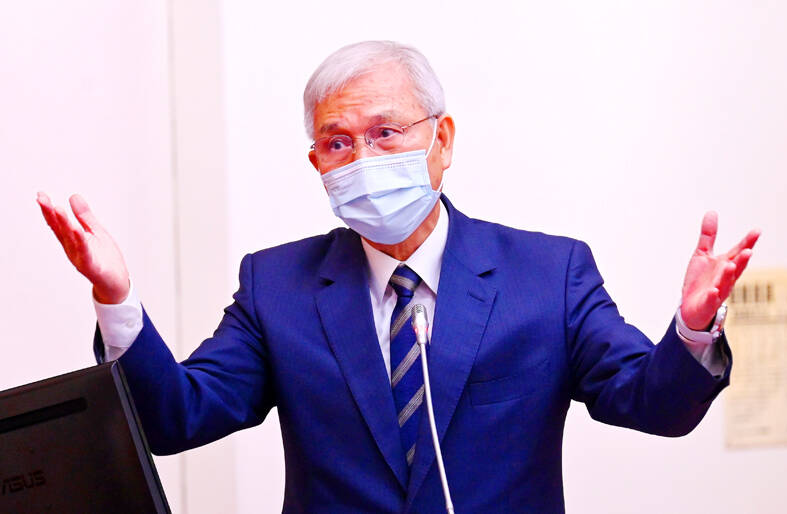Inflationary pressure in Taiwan has eased, but the central bank has no intention of cutting interest rates anytime soon, central bank Governor Yang Chin-long (楊金龍) said yesterday.
Rather, the central bank would take further steps to rein in the property market, if necessary, Yang said at a meeting of the legislature’s Finance Committee after the nation’s consumer price index (CPI) last month rose 2.42 percent from a year earlier — above the central banks’ 2 percent target — due to higher food costs.
The 4.16 percent increase in food costs had much to do with seasonal heavy rainfalls that disrupted fruit and vegetable supply and pushed up their prices, the Directorate-General of Budget, Accounting and Statistics said last week.

Photo: Liu Hsin-de, Taipei Times
However, the core CPI, a more reliable long-term price tracker because it excludes volatile items, increased 1.83 percent last month, having returned to the 2 percent target for three months in a row, Yang said.
While global central banks have lowered interest rates or plan to do so, Taiwan will not follow suit, the governor said.
Instead, the central bank will chart its own monetary policy, guided by the nation’s economic and financial interests, he said.
The central bank in March raised interest rates 12.5 basis points as it sought to quell inflation expectations ahead of electricity rate hikes in April.
Last month, the bank announced it would raise its reserve requirement ratio 25 basis points starting this month in an effort to prevent an overconcentration of real-estate loans, Yang said.
Lawmakers from across party lines have voiced concerns over steep increases in house prices induced partly by a government interest subsidy and other favorable lending terms for first-home buyers.
Rising house prices fall outside the central bank’s responsibility unless an uptrend creates bubbles and threatens the financial market’s stability, Yang said.
The system’s bad loan ratio remains at ultra-low levels and a recent stress test showed that local lenders would emerge unharmed from house price corrections, he said.
The central bank will not hesitate to take action to dampen a housing craze when it spots a need for it, the governor said, adding that the bank has tightened credit controls for purchases of luxury apartments and second homes in popular areas as well as for land financing.
Yang said he would support a pay raise for government employees to reflect economic growth, if doing so would not burden the national treasury.
In addition, a pay raise for civil servants would not fuel inflation, unlike base wage hikes that would drive up production costs for all business sectors, he said.

UNCERTAINTY: Innolux activated a stringent supply chain management mechanism, as it did during the COVID-19 pandemic, to ensure optimal inventory levels for customers Flat-panel display makers AUO Corp (友達) and Innolux Corp (群創) yesterday said that about 12 to 20 percent of their display business is at risk of potential US tariffs and that they would relocate production or shipment destinations to mitigate the levies’ effects. US tariffs would have a direct impact of US$200 million on AUO’s revenue, company chairman Paul Peng (彭雙浪) told reporters on the sidelines of the Touch Taiwan trade show in Taipei yesterday. That would make up about 12 percent of the company’s overall revenue. To cope with the tariff uncertainty, AUO plans to allocate its production to manufacturing facilities in

Taiwan will prioritize the development of silicon photonics by taking advantage of its strength in the semiconductor industry to build another shield to protect the local economy, National Development Council (NDC) Minister Paul Liu (劉鏡清) said yesterday. Speaking at a meeting of the legislature’s Economics Committee, Liu said Taiwan already has the artificial intelligence (AI) industry as a shield, after the semiconductor industry, to safeguard the country, and is looking at new unique fields to build more economic shields. While Taiwan will further strengthen its existing shields, over the longer term, the country is determined to focus on such potential segments as

COLLABORATION: Given Taiwan’s key position in global supply chains, the US firm is discussing strategies with local partners and clients to deal with global uncertainties Advanced Micro Devices Inc (AMD) yesterday said it is meeting with local ecosystem partners, including Taiwan Semiconductor Manufacturing Co (TSMC, 台積電), to discuss strategies, including long-term manufacturing, to navigate uncertainties such as US tariffs, as Taiwan occupies an important position in global supply chains. AMD chief executive officer Lisa Su (蘇姿丰) told reporters that Taiwan is an important part of the chip designer’s ecosystem and she is discussing with partners and customers in Taiwan to forge strong collaborations on different areas during this critical period. AMD has just become the first artificial-intelligence (AI) server chip customer of TSMC to utilize its advanced

While China’s leaders use their economic and political might to fight US President Donald Trump’s trade war “to the end,” its army of social media soldiers are embarking on a more humorous campaign online. Trump’s tariff blitz has seen Washington and Beijing impose eye-watering duties on imports from the other, fanning a standoff between the economic superpowers that has sparked global recession fears and sent markets into a tailspin. Trump says his policy is a response to years of being “ripped off” by other countries and aims to bring manufacturing to the US, forcing companies to employ US workers. However, China’s online warriors